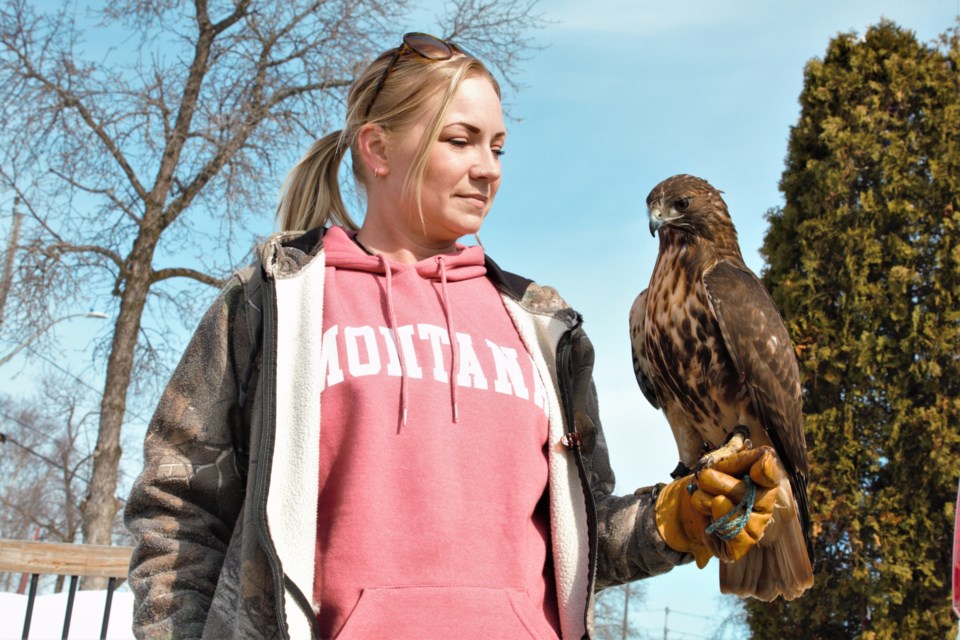THUNDER BAY – A shuttered wildlife exhibit at Chippewa Park could soon serve as a refuge for injured birds of prey, as Thunder Bay’s city council considers a request from a local wildlife rescue and rehabilitation group.
Parts of the Chippewa Park Wildlife Exhibit, closed to the public in 2017, would provide an ideal setting for the volunteer efforts of Thunderbird Wildlife Rescue, said founder Jenn Salo.
“The existing infrastructure at Chippewa is perfect for what I want to do,” she said. “It’s already there, whereas it costs tens of thousands of dollars to build a facility... It’s what I direly need for the rehabilitation of eagles, because as of right now, I just don’t have the space.”
The wildlife exhibit is slated for decommissioning and demolition, but a report from city administration recommends preserving three sections requested by Salo and leasing them to her organization.
The proposal appears feasible and wouldn’t conflict with city operations, staff concluded. As recently as last year, the park was still home to a small number of animals who could not be relocated after its closure in 2017.
City council will vote on whether to approve the recommendation to lease land to Thunderbird on Monday.
Fort William First Nation and the Friends of Chippewa Park have expressed support.
Thunderbird, which is approved to do rehabilitation work with raptors by the province, currently operates out of Salo’s backyard, where she works to nurse birds back to health and return them to the wild.
Given the need for her work – she’s taken in over 40 birds in each of the last two years – and the amount of public interest, she said a larger facility is needed.
“I never meant to run a rescue from my backyard,” she said. “It started with just taking in one or two birds, and then within a year or so, my phone was ringing off the hook and I just couldn’t keep up with the amount of birds I was [being asked] to rescue.”
Her request covers the former bird motel, flight pens, and deer yard. Those make up a “very small portion” of the facility, she said.
The operation would be closed to the public, but Salo said she envisions offering education opportunities at Chippewa Park.
She's previously had to send eagles to wildlife rescues in Southern Ontario due to a lack of required 100-foot flight pens.
Thunderbird’s work is funded by donations and sometimes out of her own pocket, Salo said. She’s in the midst of seeking charitable status.
In a report, city staff propose charging between $3,500 and $5,000 a year to lease the three sections of the facility. Salo said she hadn’t requested a discount, but would welcome any support.
As to how long-term the arrangement would be, Salo said that’s uncertain.
“I think we’re just going to have to see how it goes – let’s get year one under my belt,” she said. “Fixing the place and getting it set up to meet the standards for wildlife rehabilitation is going to take some time and money.”
Part of the long-term uncertainty lies in the desire expressed by Fort William First Nation chief Peter Collins to see the Chippewa Park lands returned to his community.
The park is part of 1,600 acres of FWFN reserve land expropriated by the federal government in 1905 to serve as a railway terminus, which forced community members to relocate.
The First Nation settled with the federal government for over 1,100 acres of that land in 2016, not including the park. Collins has called for the city to return the remaining land, calling it a step toward reconciliation.
Salo approached the FWFN council for approval, knowing the site lies on their traditional land (her use of the facility will have no bearing on the First Nation’s claim, she said).
In a letter of support for Salo’s proposal, FWFN said her work is badly needed.
“We feel there is a disproportionate neglect of the population of injured wildlife recovered in Northwestern Ontario who, unfortunately, have little or no recourse but to end up in the Ministry of Natural Resources and Forestry’s freezers or fire bins, only because no such rehabilitation services exist in this region today,” wrote consultation-liaison officer Bess LeGarde.
The Fort William First Nation Economic Development Division has also agreed to help Thunderbird with set-up costs including obtaining liability insurance.
Salo noted the public should exercise caution around any injured or dead birds they see, given the recent discovery of avian influenza strain H5N1 among poultry operations and other birds, including a red-tailed hawk, in Ontario.
“We don’t yet know how avian influenza is going to affect our local populations – that still remains to be seen,” she said.
While H5N1 is not considered a significant public health or food safety issue for humans, Salo urged residents to contact the local health unit or Ontario’s Ministry of Natural Resources if they see a sick or dead bird.



